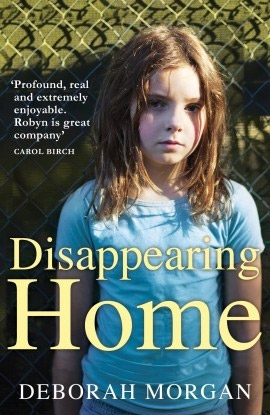
| HOME |
| NERVE |
| REVIEWS |
| ARCHIVE |
| EVENTS |
| LINKS |
| ABOUT US |
| CONTRIBUTORS |
| BACK ISSUES |
| CONTACT US |
 Disappearing
Home
Disappearing
Home
By Deborah Morgan
Tindal Street Press
£12.99
Book reviewed by Sandra Gibson - 20/11/2012
Deborah Morgan’s story of a child growing up in a dysfunctional family, with a violent stepfather, is regrettably a common theme. Such accounts have been labelled misery memoirs but Disappearing Home is not in this category. This is not a miserable story. The edgy fearfulness is off-set by episodes of positivity and by the creative intelligence of the main character, aged ten, through whom the story is told. Robyn emerges as being more of an adult than either of her parents, who teeter on the edge of drunkenness, insolvency and violence throughout.
This well-received debut novel, endorsed by Alan Bleasdale, Carol Birch and Jimmy McGovern grabs the attention immediately because the writer knows that there is no such thing as a minor detail. The background: a Liverpool housing estate during the power cuts of the Seventies is economically delineated with contemporary references to food, furniture, sweets, days out, clothing, school discipline, Catholicism and smoking. Washing mangles that crack the shirt buttons - Stork Margarine - Omo - where are you now? Everyone goes about clutching their cigarettes and matches: a relentless image for self-destructive behaviour. And there are other strident metaphors picked up by Robyn’s intense observational focus. The story starts with emblems of poverty and affluence and there is a pervasive reference to gold. A battered and dirty swag bag, whose handles have worn out so they cut into the child’s hands, is contrasted with a pristine vanity case owned by one of the other girls. This entirely desirable object, envied by the other kids and conferring high status on its owner, presents a glimpse into the adult world of acquisitiveness as well as addressing another recurring theme - that of getting ready to go out. In one defining moment Robyn dresses up in her mother’s clothes and innocently uses a sanitary towel as a headband.
Robyn has her own version of the elephant in the room. There’s a tablecloth whose holes are getting bigger and bigger so that the things on the table no longer conceal them: “like I don’t know how to pretend I see nothing at all. Nothing at all gets bigger, as big as a mountain,” and this is linked with the conspiracy of silence that Robyn has entered into with her family - a barrier the ineffectual social worker cannot penetrate even though he knows there is a problem.
Disappearing Home has an all-pervasive visceral quality. If this novel were a film the poster would have a boxer at its centre because this is a physical world where you have to survive bullying on all levels. Brutal yes; but a survival image nevertheless and Robyn sees her boxer grandfather as a role model echoed, to some extent, in her friend Bernie and as a foil to her brutal father.
On the threshold of puberty, Robyn sees her body as problematic even though she is responsive to those springtime feelings. She is growing too big for her ski pants and the stirrup band cuts into her feet. Her observation of people’s faces reveals repellent details: spittle, snot, lines, facial hair, people gobbing in the street, Edna chewing gum. There’s blood, vomit, shit, pee - stuff coming out of bodies in all its lurid actuality.
But despite the fear of living with unpredictability - the repossession of their household contents is casually mentioned at one point - there are moments of positivity and stability. That Robyn has well-developed nurturing skills shows whilst she is at the refuge and her relationship with her Nan is mutually nourishing. Robyn leaps joyfully over a bonfire at one point and the description of her riding a bike is memorable. Although her mother is weak and vacillating, Robyn finds the one positive overriding truth: “She could have given me away but she never. That’s all that matters now,” which tips the balance.
Overall, the author has produced an interesting and admirable character in Robyn, whose salvation lies with her imaginative communicative powers: “he smiles into the other side of his eyes.”…I want to turn his eyes inside out. See what he sees,” and the creative wisdom that helps her to assess and survive the situations she finds herself in. There’s a lot to learn through observing the contents of washing lines! The novel leaves various issues open to speculation: some things are left open, others are not resolved in the way the reader might expect and the writer has resisted the trite and the sentimental - as the final image reveals.
Deborah Morgan must be congratulated for her linguistic resourcefulness and her prodigious capacity for story-telling - echoed in Robyn’s desire to read stories and her grandmother’s eagerness to have the stories told.
More please.
Sandra Gibson interviews Deborah Morgan here